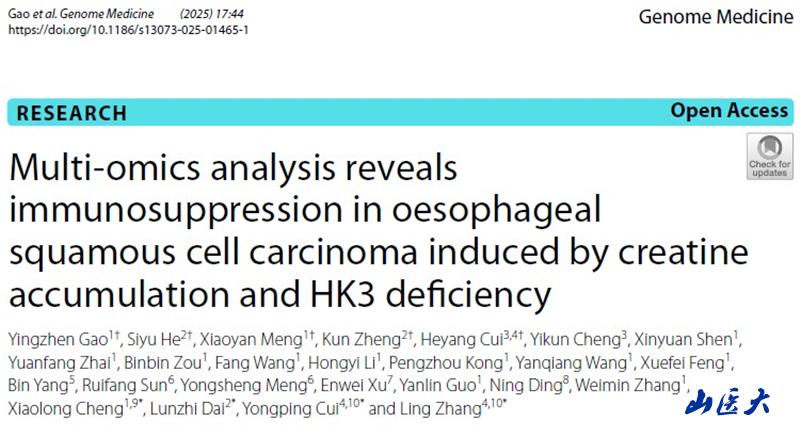Recently, the Key Laboratory of Cell Physiology of the Ministry of Education of our university, the Institute of Pathogenesis and Clinical Transformation of Esophageal Cancer in the School of Basic Medicine, and West China Hospital of Sichuan University jointly published a paper titled "Multi-omics analysis reveals immunosuppression in oesophageal squamous cell carcinoma induced by creatine accumulation and HK3 deficiency" in the international journal Genome Medicine (a top-tier journal in the first-zone of the Chinese Academy of Sciences, with an IF of 10.40). Gao Yingzhen, a doctoral student from our university, is the first author, and Professors Zhang Ling, Cui Yongping, and Cheng Xiaolong are the co-corresponding authors.

Esophageal squamous cell carcinoma (ESCC) is the main type of esophageal cancer in China, accounting for approximately 90% of all esophageal cancer cases nationwide. Characterized by high heterogeneity, its 5-year survival rate is only 20%. In recent years, although immunotherapies such as immune checkpoint inhibitors (ICIs) have shown certain efficacy, only 30%-40% of patients can benefit from them, and drug resistance is widespread. In-depth exploration of the heterogeneity of the immune microenvironment and immunosuppressive mechanisms in ESCC is of crucial significance for identifying new therapeutic targets and enhancing the effectiveness of immunotherapy.
The researchers conducted metabolomic and proteomic analyses of ESCC, which allowed for a detailed characterization of the protein-metabolic landscape in ESCC.By integrating these findings with previous genomic and transcriptomic data, the molecular features of ESCC were further enriched. Furthermore,based on proteomics and metabolomics, three subtypes (S1, S2, and S3) with significantly different metabolic-immune characteristics were identified, and a subtype prediction model was developed. The S3 subtype exhibited the worst prognosis, with a significantly suppressed immune microenvironment, manifested as an increase in the infiltration of M2-type tumor - associated macrophages (TAMs) and a decrease in the infiltration of CD8+T cells, CD4+ T cells, and NK cells. Creatine accumulation and reduced hexokinase 3 (HK3) protein expression were two characteristics of the S3 subtype. Subsequently, through animal and cell experiments, the researchers found that creatine accumulation and decreased HK3 might mediate an energy transformation. These two factors, by reprogramming the energy metabolism of TAMs, synergistically drive the polarization of TAMs into the M2 type, thereby remodeling the immunosuppressive microenvironment of ESCC.

This study, through multi-omics analysis, analyzed the microenvironmental heterogeneity of ESCC from the perspective of metabolic-immune interactions, revealed the remodeling effect of creatine accumulation and HK3 deficiency on the tumor microenvironment of ESCC, and emphasized the importance of metabolic reprogramming in tumor immunosuppression. The research results provide new ideas for targeting creatine metabolism to improve the efficacy of immunotherapy and targeted therapy for ESCC.
The research team led by Professor Cui Yongping, which focuses on the pathogenesis and clinical transformation of esophageal cancer, has long been committed to the study of the pathogenic mechanism of esophageal cancer. A series of original achievements obtained by the team have provided a theoretical basis for clarifying the pathogenic mechanism and molecular typing of esophageal cancer, finding effective diagnostic markers, drug targets, and formulating clinical precision treatment plans.